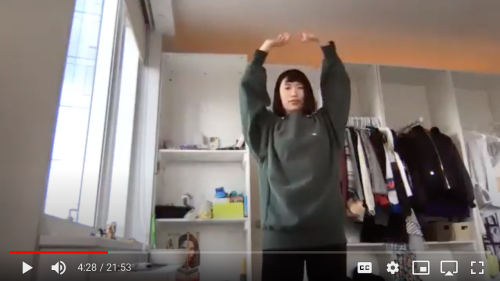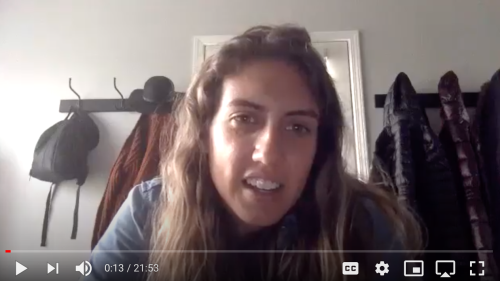“How are you doing today?” a graduate student in the Department of Occupational Therapy asked her patient over a video call, smiling into the camera.
“Fine,” they replied, shaking their head.
“How are your pain levels?” she tried again.
“Good...”
Undeterred, the occupational therapist (OT) continued asking questions, slowly gathering additional information from her patient.
While it’s natural for health professionals to encounter subdued clients, this situation was a bit unique – the patient was actually a student actor from NYU Steinhardt’s Educational Theatre program purposely responding succinctly to help the therapist learn to read non-verbal cues.
Collaboration in the Face of COVID-19
With the pandemic restricting in-person fieldwork and internship placements, Associate Dean for Global Affairs and Experiential Learning and Clinical Professor of Nutrition Lisa Sasson knew her team needed to find a way to ensure Steinhardt’s future practitioners in the Departments of Applied Psychology, Nutrition and Food Studies, Occupational Therapy, and Physical Therapy still had the crucial opportunity to practice working with and counseling patients.
Pulling from her own experience as a clinician, Sasson thought about the “standardized patient” model frequently used in medical and nursing schools. Under this model, volunteer actors portray patients to create realistic, standardized medical scenarios for the students to practice navigating. Could Steinhardt create a similar model by collaborating with student actors in the Department of Music and Performing Arts Professions?
The situation caused by the pandemic made it very clear to me how interconnected Steinhardt’s programs in health, education, arts, and human development are, and how unique it is to have such interdisciplinarity in one school.
“It was my ‘aha’ moment to contact Joe Salvatore in Educational Theatre to discuss if his students could have a meaningful experience being ‘simulated actors’ and serving a great need for fieldwork and internship students in other programs,” Sasson said.
With Clinical Associate Professor of Educational Theatre Salvatore’s students also in need of fieldwork hours, an interdisciplinary collaboration was born. “We were all pivoting in the moment and trying to figure out ways to help our students meet their needs in a variety of contexts,” he said.
Salvatore recruited a “patient actor ensemble” of graduate and undergraduate students taking his Applied Theatre Praxis course as well as volunteers from the Educational Theatre program at large. Coordinating scheduling and scripts between the ensemble and the health programs, Senior Associate Director of Experiential Learning Vivienne Felix helped the ensemble serve over 300 Steinhardt students – including future registered dietitian nutritionists, occupational therapists, physical therapists, school counselors, and mental health counselors.

Educational Theatre student actor Rita Liu completing a series of jumping jacks during a session with an OT student.
One member of the actor ensemble, Rita Liu, is currently pursuing her MA in Educational Theatre in Colleges and Communities. Speaking about the experience of participating in the group, Liu said, “As an actor, we normally live in our artistic world, which is our comfort zone. However, stepping outside the field and using theatre techniques for students pursuing health professions makes me feel excited to see a future where different professions interweave.”
So far Liu has portrayed a variety of patient roles over video conference, including an elderly woman with a hip fracture and an eight-year-old boy with learning disabilities.
“I enjoyed being the eight-year-old the most. I was experiencing my own mental health struggles at the time I was portraying the child, but getting into that character changed my perspective and I was enlightened by simple things that I would ignore as an adult.”
Preparing Professionals for the Telehealth Future
With expectations that recent increases in the popularity of telehealth will persist after the COVID-19 pandemic, it became clear to faculty that educating the next generation of health professionals must include exposure to working with patients over video conference.
“This collaboration affords us a new way to ensure that our students are equipped to handle these new virtual clinical performance expectations,” said Occupational Therapy Academic Fieldwork Coordinator Alison Rangel.
Current MS in Nutrition and Dietetics student Christina Idol echoed this sentiment when describing her experience counseling patient actors through nutrition related-diseases by video.
“I think I speak for the entire class when I say we felt this experience was as close to counseling a real patient in a telehealth setting as possible,” she said.
I personally felt this experience helped me adapt to answering difficult questions in the moment, develop my interviewing skills and counseling strategies, and become more comfortable and confident when interviewing and counseling real patients or clients.
For the Educational Theatre students, participating in the student actor ensemble provided an opportunity to practice their improvisation skills, learn to work within the frame of a screen, and examine what makes a portrayal of a patient authentic or stereotypical.
“We like to think about holistic training and developing multiple skill sets,” Educational Theatre’s Joe Salvatore said. “In this case, helping students understand and experience working in a telehealth or health context introduces them to possibilities of theater and job opportunities that they may not have thought about before.”
Looking Ahead
For Occupational Therapy’s Alison Rangel, the benefits of this type of interdisciplinary collaboration will extend beyond the current COVID-19 moment.
"Positive feedback from our clinical partners about how our students were prepared to perform and navigate this virtual environment with ease solidified our decision to use this model again,” she said.

Students like Alexis Niccum, one of the OT students who collaborated with actor Rita Liu, can now learn from recorded sessions covering a range of therapy scenarios.
Moreover, the virtual environment provided a new opportunity for instructors to provide annotated feedback on recordings of patient actor sessions, helping students identify their strengths and areas for improvement.
“The students could review their recorded clinical performance objectively, which was a fantastic feedback tool,” Rangel said. "The recordings have also provided us with a library of instructional content and serve as an educational tool to model best practices during treatment sessions.”
“It was interesting to see how my classmates responded to the same ‘patient’ and see if they recommended similar interventions that I did,” said MS in Nutrition and Dietetics student Julia DiPietrantonio.
The patient actor ensemble continues to operate as the pandemic persists, with hopes for expanding the group to include Educational Theatre alumni and involving additional Steinhardt departments in the collaboration.
“I hope we can find more ways to collaborate with additional programs in the near future,” Educational Theatre student actor Rita Lui said. “I felt empowered to be helpful. Acting is not only about performing, but also about acting out as an active action.”
